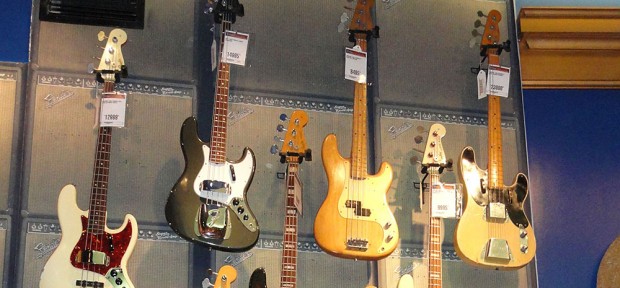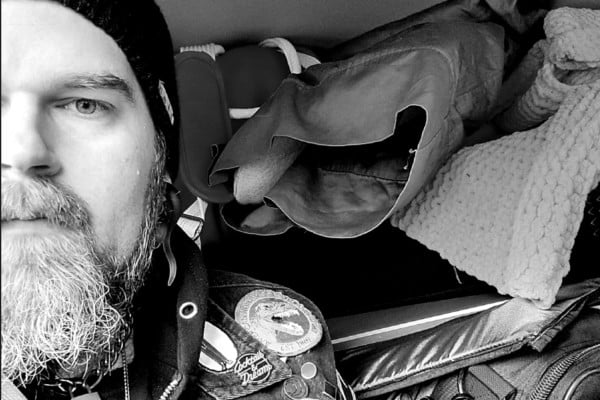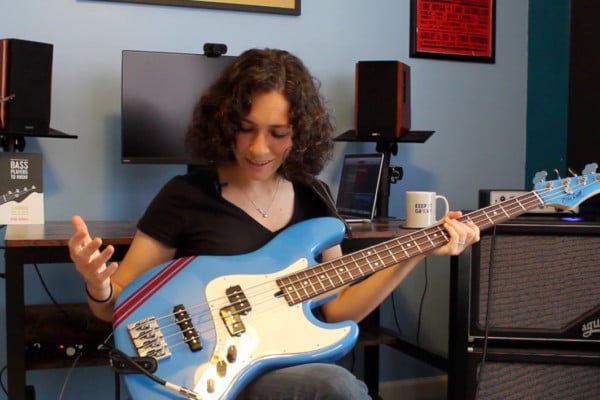Spend Money to Make Money: A Discussion for Bass Players

Yes, that’s right, the words of my college accounting professor ring true to this day. You need to spend money to make money.
While we often think of this term in reference to the boring section of the local paper or as the guiding principle behind buying lemons to sell lemonade, it’s impossible to think of any business, and especially the music business, without seeing evidence of this concept. If you’re a working bass player, spending money is a given; it’s an investment in your small business. If you’re a low-end newbie or a long time hobbyist, then it may be the right time to expand your gear collection or schedule a few lessons. Coincidentally, as your musical education or your career evolves, so do your expenses. Keeping up with the Jones’s isn’t cheap, few of us can resist lusting over new gear, and there are plenty of reasons why you should make some sound investments (pun intended).
If you’re fairly new to the low end, taking a leap from your first bass to your first “pro” bass may require quite the investment but hopefully it will generate a good return. You don’t necessarily have to spend a lot of money on a bass but you do need to have one that is in good condition, is set up well, and appropriate for the style of music you play. Having a bass that you enjoy practicing on may be return enough; you don’t need to be a gigging player yet in order to justify buying a better instrument. A bass that inspires you to hone your craft or explore new creative possibilities isn’t something to be taken lightly and is definitely worth saving up for.
While you may still be new to the instrument, if you aspire to join a band or play live, you’ll need more than just a bass. That 15-watt practice amp won’t stand up to a drummer, you need to show up with a non-crackly instrument cable, and a guitar stand and tuner are other “must haves.” As with any investment, make sure you do your due diligence to find the appropriate equipment. Consider the types of venues you’ll be playing, the tone you want, how to makes things work with your budget, and whether or not these investments will allow you to grow as a player and/or professional.
When it comes to being a working bass player, it’s essential for you to have reliable, versatile, and transportable gear. Coincidentally, the more you get hired to play and the “bigger” the shows are, the more gear you’re likely to need. It’s a catch twenty-two—in order to play better gigs, you’ll need to make greater investments in gear, but, you may not be able to invest in the gear until you get the gigs. It can take time to acquire what you need and not all gear is necessary for every type of gig. As a studio player, you may need half a dozen basses to choose from for a particular session. As a live player, you can get away with one or two good instruments for your regular gig. General maintenance (new strings, batteries, set ups, and repairs) must be factored in as well—if your bass doesn’t work well, it won’t do you any good.
Of course, gear isn’t the only investment that we need to make as musicians. Trust me, I can find plenty of ways to spend money, some of which have greater return than others. Education can be a huge expense but it may provide great personal and professional reward. Going to school for music or taking private lessons can put quite the dent in your bank account, but if you graduate with a degree or learn an important skill, you will be able to capitalize on that knowledge. Clinics, master classes, and camps are also worthwhile if you need inspiration, want to jump start your practice routine, or hope to network with other bass players.
Spending money on music is equally important, whether you’re buying records or going to a live performance. Going to see a band on a Friday night and dropping $20 for a cover charge and a drink is a small price to pay, especially if you experience a great band and run into fellow players. It’s almost impossible to put a price on networking, being on the scene, and keeping in touch with the people who are likely to hire you (this includes other bass players looking for subs).
And finally, any businessman knows that you need to include advertising, marketing, and branding when you’re creating a budget. This may include designing and printing business cards, developing a website and online presence, creating merchandise for your band, or promoting your shows or record releases. It’s equally important to cultivate a “look” for when you’re gigging or when you’re out on the town and networking. Many people will hire band members for their presence and image as much as for their playing. Having the appropriate attire for a gig, be it a collection of hip t-shirts and torn denim for bar gigs or a tux for playing in a wedding band, is very similar to having the proper gear. Alas, another credit card bill.
With all of these expenses, from lessons and education, to gear, maintenance, wardrobe, and business cards, trying to make it “in the black” may seem impossible. Thankfully, it’s not, and if you make logical investments, you’ll probably make your money back and then some within a handful of gigs. If your not a working player, but enjoy learning and practicing the instrument, then you can pick and choose what to spend your money on… perhaps it’s a vintage P-bass or a trip to bass camp. Either way, don’t be afraid to spend some money to make money or gain motivation.
What was your last “smart investment” in the world of bass? Share your story in the comments.
Ryan Madora is a professional bass player, author, and educator living in Nashville, TN. In addition to touring and session work, she teaches private lessons and masterclasses to students of all levels. Visit her website to learn more!




I’ve learned from playing larger venues (state fairs, large clubs) that supply production you don’t typically need stage gear as it may provided. I’ve found that a good in ear monitor system and DI/preamp get the job done for me. I no longer need to lug around my stack. I own a couple of 1/12 cabs and a 350 watt head that handle small to medium size venues.
where I see most players fall flat is in the small stuff. I know guys with multi thousand dollar guitars who have crackling cords, dirty pots, terminally dead batteries, intonation issues, and/or amps that sound like a drink blender. You need to build in basic, ongoing maintenance as a fixed cost of doing business (change your batteries when you change stings, pick up a guitar cord every other time you go to the music store, take your bass in for an adjustment every change of season, etc), or learn how to do it yourself. Either way, stick to a schedule and check your gear every few gigs.
Also, Protip: if you’re too cheap to buy a tux (or don’t wear one often), buy a black suit. You can wear the suit with a shirt and tie for fancy gigs (goes with anything), get a tux shirt (or regular white shirt) and a clip on bow tie for a “musician’s tux”, and pair the jacket with khakis for less formal gigs.
so true! you don’t necessarily need the “best”, but something appropriate to the level you will be doing. it’s not the cost of the instrument, as much as the talent behind it, but good reliable equipment is essential.
This is very inspirational. Thanks.
You don’t need the most expensive gear but more KEIKO,KEIKO,KEIKO !!
Keep it simple. Use your vintage bass for recording and such, I always have backup bass, good cords and my DI box. It’s also nice to have a custom fitted inear monitors. Most of the time your stage gear is supplied. If not, have a 410 cabinet and 350 watt head. and if money is tight you can buy a used TUX at most rental stores.
Using passive or active electronics tends to be a highly heated debate as to which is better or more suitable for gigs or the studio, but whether or not you have a QUARTERSAWN neck doesn’t get discussed enough. Often manufactures will keep the same electronics or features with an imported version of the flagship model, but the wood, more importantly the way it is cut and joined together at the neck joint is entirely different. When you are making the leap to go pro or buy higher end gear the neck wood and tight neck joint really helps keep your neck straight (also improves sustain). When your bass experiences altitude changes, hot equipment trailers, gigs in the sun and those sub-zero temperatures things change over night. One day you have the perfect setup and the next day a Chaquita banana.
I have spent the last 4 years studying music at a college/university level and I have experienced some really great rewards in my time studying. The best thing for my money making has been a great connection with my bass instructor and the other faculty members. Having a good relationship with my professors has gotten me more gigs than I can count. The same goes for any other bassists and musicians in your music scene. Secondly I have had some very valuable opportunities to learn about the music business- from products to planning a tour. Take some time to learn about the boring stuff like book keeping, contracts, and even how music publishing works. Any knowledge you can obtain may help out down the road to landing a gig. Check out Rickey Minor’s book called There is no traffic on the extra mile. There are some great things in there for any musician.
As far as gear goes I would say keep it simple and know your equipment well. I can get just about any sound I need on a gig out of my jazz bass and with minimal eq adjustments on my amp. If you are looking into a great sounding cabinet that is affordable consider TC electronic. I have a 2×12 and I haven’t had anything but great reviews. Its big enough to cut through mid-size venues and small enough that 1 person can still carry it. For the small stuff and accessories I would say don’t cheap out. Buying a $75 cable vs a $15 cable will affect your sound and can make your bass sound as good as it can. Go for a cable with a lifetime warranty. Do your research before buying/trying any piece of gear.
Lastly I would say continuous investment of your time is a key factor to success in the industry. Whether you are practicing your technique or reading up on articles like this one, spend a couple hours a week doing the extra things instead of plopping down and turning on netflix and you would be surprised at how it may improve your musicianship down the road.
Gerald Veasley’s Bass Bootcamp is one of the best investments I make. Coincidently, that’s where I cross paths with Ryan. Good fortune and good karma.
A proper old-school All Tube bass head & 410 are a must for live work. You can add things or use a smaller rig for some gigs, but will be able to pull off 90% of all live stuff with this set-up.
yeah, bought a new set of Roto Sound 66 ” Swing bass” strings. put them on my everyday knockabout bass that i have at home. what a sounf difference. lovely rounded punch coming of them. best strings around folks !! ” Roto Sound “
Agree with most, except the 410 cab.
I have taken lessons from Sarah Brown that made all the difference in the world, found a Genz-Benz used and have a couple fine basses.